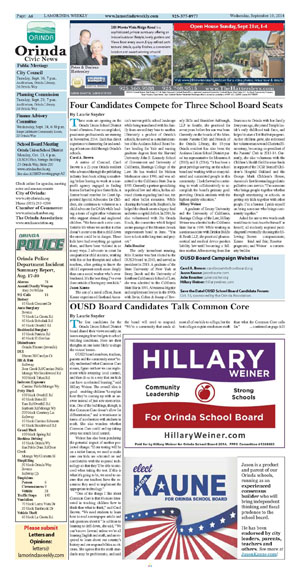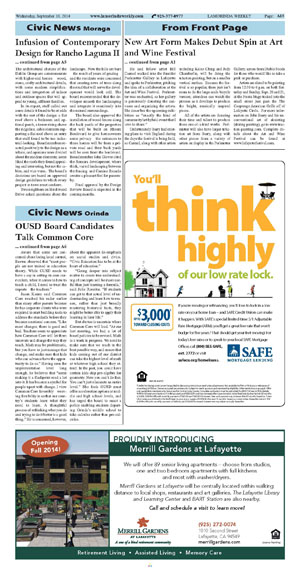|
|
Published September 10th, 2014
|
OUSD Board Candidates Talk Common Core
|
|
| By Laurie Snyder |
|
|
The four candidates for the Orinda Union School District board shared their views recently on issues ranging from budgets to school building conditions. Here are their thoughts on one issue likely to shape the victors' tenure.
 OUSD board members, teachers, parents and the community must "really understand what Common Core means, figure out how we can implement while retaining local control, and then do so in a way that our kids can have accelerated learning," said Hillary Weiner. The overall idea is good - enabling children "to explain how they're coming up with an answer instead of just rote memorization. One of the bad things, though, is that Common Core doesn't allow for differentiation," and is worrisome in terms of acceleration with students in math. She also wonders whether Common Core could end up taking away too much local control.
OUSD board members, teachers, parents and the community must "really understand what Common Core means, figure out how we can implement while retaining local control, and then do so in a way that our kids can have accelerated learning," said Hillary Weiner. The overall idea is good - enabling children "to explain how they're coming up with an answer instead of just rote memorization. One of the bad things, though, is that Common Core doesn't allow for differentiation," and is worrisome in terms of acceleration with students in math. She also wonders whether Common Core could end up taking away too much local control.
 Weiner has also been pondering the potential impact of another projected change. "If our testing will be on a tablet format, we need to make sure our kids are educated on and comfortable with the required technology so that they'll be able to succeed when taking the test. If this is what it's going to be, we need to ensure that our teachers have the resources they need to implement the appropriate technology."
Weiner has also been pondering the potential impact of another projected change. "If our testing will be on a tablet format, we need to make sure our kids are educated on and comfortable with the required technology so that they'll be able to succeed when taking the test. If this is what it's going to be, we need to ensure that our teachers have the resources they need to implement the appropriate technology."
 "One of the things I like about Common Core is that it's more interested in teaching children how to think than what to think," said Carol Brown. "We need students to learn how to read a newspaper article and ask questions about it." In addition to learning to drill down, she said, "We can't move forward unless we're all learning English and math, and are required to learn about our country's history and our responsibilities as citizens. She agrees that the math standards may be problematic, and said the board will need to respond. "We're a community that sends almost all of our kids to college, but the best colleges require much more math than what the Common Core calls for."
"One of the things I like about Common Core is that it's more interested in teaching children how to think than what to think," said Carol Brown. "We need students to learn how to read a newspaper article and ask questions about it." In addition to learning to drill down, she said, "We can't move forward unless we're all learning English and math, and are required to learn about our country's history and our responsibilities as citizens. She agrees that the math standards may be problematic, and said the board will need to respond. "We're a community that sends almost all of our kids to college, but the best colleges require much more math than what the Common Core calls for."
 Aware that some are concerned about losing local control, Brown observed that "most people are not trained in education theory. While OUSD needs to have a say in setting its own curriculum, when it comes to how to teach a child, I need to trust the experts - the teachers."
Aware that some are concerned about losing local control, Brown observed that "most people are not trained in education theory. While OUSD needs to have a say in setting its own curriculum, when it comes to how to teach a child, I need to trust the experts - the teachers."
 Jason Kaune said Common Core reached his radar earlier than many other parents because he has corporate clients who were required to start building tools to address the standards before they became a national concern. "Like most changes, there is good and bad. Teachers seem to appreciate how Common Core will let them innovate and change the way they teach. Math may be problematic, but you have to just manage that change, and make sure that kids who can advance have the opportunity to do so." Having seen the implementation level long enough, he believes that "some making it a flashpoint read a lot into it. It has become a symbol for people upset with change. I view Common Core favorably - weaving flexibility in so that our country's students learn what they need to learn. A thoughtful process of rethinking what you do and trying to do it better is a good thing." He is concerned, however, about the apparent de-emphasis on social studies and civics. "Civic Education has to be at the heart of education."
Jason Kaune said Common Core reached his radar earlier than many other parents because he has corporate clients who were required to start building tools to address the standards before they became a national concern. "Like most changes, there is good and bad. Teachers seem to appreciate how Common Core will let them innovate and change the way they teach. Math may be problematic, but you have to just manage that change, and make sure that kids who can advance have the opportunity to do so." Having seen the implementation level long enough, he believes that "some making it a flashpoint read a lot into it. It has become a symbol for people upset with change. I view Common Core favorably - weaving flexibility in so that our country's students learn what they need to learn. A thoughtful process of rethinking what you do and trying to do it better is a good thing." He is concerned, however, about the apparent de-emphasis on social studies and civics. "Civic Education has to be at the heart of education."
 "Going deeper into subject matter to create true understanding of concepts will be more useful than just learning a formula," said Julie Rossiter. "If students can get to that actual level of understanding and learn how to reason, rather than just broadly mastering historical facts, they might be better able to apply their learning in later life."
"Going deeper into subject matter to create true understanding of concepts will be more useful than just learning a formula," said Julie Rossiter. "If students can get to that actual level of understanding and learn how to reason, rather than just broadly mastering historical facts, they might be better able to apply their learning in later life."
 But she too is uncertain where Common Core will lead. "At our last meeting, we had a lot of board policies to be revised. Math is a work in progress. We need to make sure that we teach in the best possible way, and ensure that kids coming out of our district can take the highest level of math at whatever high school they attend. In the past, you could have certain kids skip pre-algebra for geometry. Now you can't do that. You can't just eliminate an entire level." She feels OUSD must offer acceleration options at middle and high school levels, and has urged the board to enact a policy enabling students departing Orinda's middle school to take calculus rather than pre-calculus.
But she too is uncertain where Common Core will lead. "At our last meeting, we had a lot of board policies to be revised. Math is a work in progress. We need to make sure that we teach in the best possible way, and ensure that kids coming out of our district can take the highest level of math at whatever high school they attend. In the past, you could have certain kids skip pre-algebra for geometry. Now you can't do that. You can't just eliminate an entire level." She feels OUSD must offer acceleration options at middle and high school levels, and has urged the board to enact a policy enabling students departing Orinda's middle school to take calculus rather than pre-calculus.

|
|
|
|
|
|
|
|
|
| |
|
|
|
|



